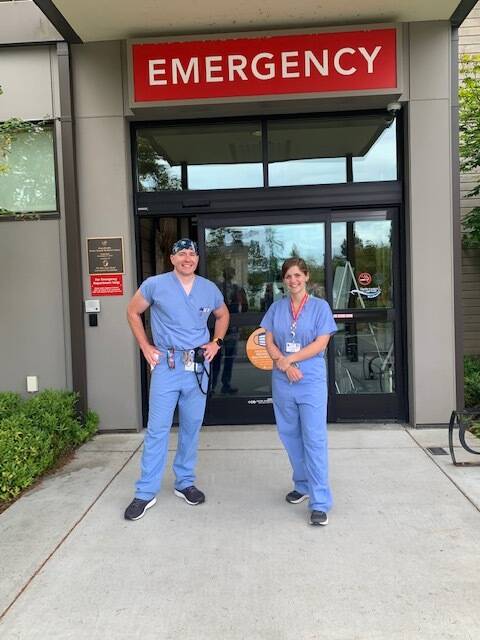PeaceHealth Peace Island Medical Center broke records for emergency admittance over the July 4th weekend keeping new rural resident rotation doctors, Dr. Ryan Bocca and Dr. Mell Pinkston on their toes.
“I saw more patients than I would have at Harbor View,” Bocca said.
Eight summers ago, the University of Washington and Peace Island collaborated together to form a program that would encourage medical students to take positions in rural settings. The program currently has four residents on a month-long rotation in Friday Harbor. Bocca arrived toward the end of June, Pinkston in early July. Two more will come for the month of August.
According to a PeaceHealth Peace Island employee news article, there has been a shortage of board-certified emergency physicians in rural emergency departments across the nation since pre-COVID. Currently, approximately only 25 percent of physician providers in rural emergency departments are specialty trained in emergency medicine, while urban emergency departments boast over 75 percent. If trends continue, rural emergency department patients, like those in San Juan County, will continue to be denied the specialty care delivered to patients in urban hospital emergency departments.
Jason Heiner M.D., who oversees the University of Washington and PeaceHealth Peace Island resident rotation program, said several studies have suggested emergency medicine physicians are more likely to choose to live and work in a rural setting if they had completed a rural rotation in such a site during their residency training.
“One of the first things the residence always learn is that it tests their medical knowledge because there is no specialist, no trauma specialist, no oncologists,” Heiner said.
Pinkston said she noticed right away residents did not have the backup from specialists they usually do. However, she added the hospital is very efficient and the test results and CT results from X-Rays are received back incredibly fast.
Pinkston grew up in a small town in Massachusetts where the nearest hospital was 30 to 40 miles away. She sees similarities between her childhood home and Friday Harbor.
“I can appreciate a population that doubles and triples in the summer,” Pinkston said.
Pinkston would like to go into emergency medicine. “Prehospital emergency care is the most interesting to me, from the scene of the accident to stabilizing them in the emergency room,” she said.
When asked what a day in the emergency room looked like, Pinkston said it kicks off as soon as she walks in the door, sees patients, calling for tests, and X-rays. “It’s hard to describe a day because it’s different every day,” she said.
Pinkston also said the doctors at Peace Island are incredibly caring and invest in and advocate for their patients.
The community has already welcomed her, giving her local tips including the best hiking trails. “The locals are pretty friendly and chatty,” she said.
Bocca is originally from Philadelphia, Pennsylvania. He became a bio-engineer first but decided he wanted to get into critical care medicine and have a more direct relationship with the patients.
Wanting to attend a four-year medical program, Bocca was accepted by Jefferson College through a match program. Students fly all over the country for a month, visiting possible programs. In the end, they rank the colleges, and the colleges rank them. On what is called matching day, the student receives an envelope telling them where they were matched to. A week following that, they get a letter detailing not only where, but when, how long and what their specialty will be. The medical profession, Bocca said, has been doing this for 30-plus years. The student incurs the travel expenses during all this time.
“The amount of student debt you go into, most doctors don’t make any money until they have been practicing for about 30 years,” Bocca said, adding that resident doctors make close to minimum wage given the number of hours they work. Bocca also pointed out school is taking longer as knowledge and technology have increased which also impacts the cost. “That standpoint alone limits the amount of students going into the medical profession,” Bocca said.
With fewer people going into the medical profession, it is even more important for those students to get exposure to rural emergency care.
“I would like to expand the program, and have the rotating doctor in Friday Harbor early, and come out two or three times during their training,” Heiner said. “Peace Island and the U.W. would be supportive.”
Heiner expressed gratitude to the hospital for providing the opportunity and the U.W. for their commitment.
“It’s really cool to follow up with these guys three or four years later. Some of them have gone on to practice in rural settings,” Heiner said.



